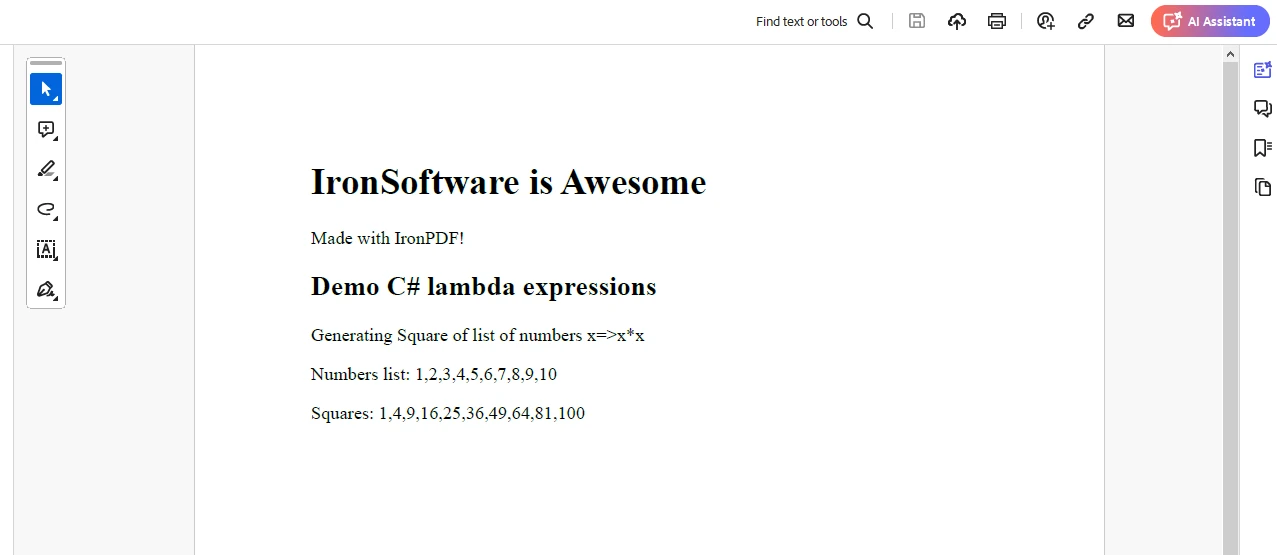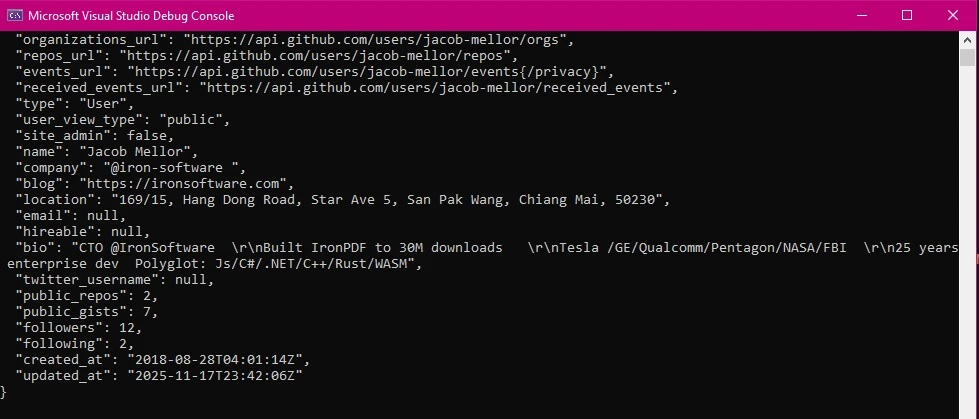C# Lambda Expressions (How It Works For Developers)
In the realm of C# programming, lambda expressions stand as one of the most powerful features. These concise and expressive constructs enable developers to write compact yet robust code, enhancing readability, maintainability, and overall efficiency.
In this article, we'll dive deep into C# lambda expressions, exploring their syntax, use cases, benefits, and advanced techniques. We will also be exploring how IronPDF's capabilities from Iron Software can generate a PDF document on the fly in C# applications.
Understanding Lambda Expressions
Lambda expressions, introduced in C# 3.0, provide a succinct way to define anonymous functions or delegates. They are essentially inline anonymous functions that can be used wherever a delegate type is expected.
The syntax for a lambda expression is:
(parameters) => expression // lambda expression syntax(parameters) => expression // lambda expression syntaxExample:
x => x * x // lambda expression to square a numberx => x * x // lambda expression to square a numberHere, parameters are the input parameters of the lambda expression, and expression is the statement or block of statements to be executed. The .NET common language runtime creates an anonymous function for each lambda expression during compile time.
Basic Usage
Let's look into an example for Lambda expression where we have a list of integers, and we want to filter out the even numbers.
We can achieve this using the List<T>.FindAll method along with a lambda expression:
List<int> numbers = new List<int> { 1, 2, 3, 4, 5, 6, 7, 8, 9, 10 };
List<int> evenNumbers = numbers.FindAll(x => x % 2 == 0);List<int> numbers = new List<int> { 1, 2, 3, 4, 5, 6, 7, 8, 9, 10 };
List<int> evenNumbers = numbers.FindAll(x => x % 2 == 0);In the above example, x => x % 2 == 0 is a lambda expression that takes an integer x as an input parameter and returns true if x is even, and false otherwise. The lambda body expression is executed on each list element.
Use Cases
Using a Lambda expression in modern application programming finds a variety of use cases, including:
- LINQ Queries: Lambda expressions are extensively used in LINQ (Language Integrated Query) to perform filtering, projection, sorting, and grouping operations on data collections.
- Event Handling: When working with events and delegates, lambda expressions provide a concise way to define event handlers inline.
- Asynchronous Programming: In asynchronous programming patterns like
Task.Run, lambda expressions can be used to define the asynchronous operation to be executed. - Functional Programming: Lambda expressions support functional programming paradigms, enabling operations like map, filter, and reduce on collections.
Types of Lambda expressions
Expression Lambdas
Lambda expressions with => are called expression lambdas. They take the format:
x => x * x // expression to square a numberx => x * x // expression to square a numberIn the above example, we are creating a square of a number. In expression lambdas, the body can include method calls. However, when generating expression trees intended for evaluation outside the .NET Common Language Runtime (CLR), such as in SQL Server, it is advisable to avoid any method call within lambda expressions.
This is because methods may lack meaning outside the CLR context. Therefore, it's crucial to consider the target environment when constructing an expression tree to ensure compatibility and meaningful interpretation.
Statement Lambdas
Statement lambda expressions allow multiple statements and provide more complex operations:
Func<int, int> mySquareDelegate = (x) =>
{
return x * x;
};
Console.WriteLine(mySquareDelegate(4)); // Output: 16Func<int, int> mySquareDelegate = (x) =>
{
return x * x;
};
Console.WriteLine(mySquareDelegate(4)); // Output: 16In this code, a delegate is declared that operates on integers and returns their square. The lambda body can encompass multiple statements inside a block {}.
Advanced Techniques
Capturing Variables
Lambda expressions can capture variables from the enclosing scope. This feature, known as variable capturing or closure, allows lambda expressions to access and use variables declared outside their body:
int factor = 2;
Func<int, int> multiplier = x => x * factor;int factor = 2;
Func<int, int> multiplier = x => x * factor;In this example, the lambda expression x => x * factor captures the factor variable from the enclosing scope.
Multiple Parameters and Statements
Lambda expressions can have more than one parameter and execute multiple statements enclosed in a block:
Func<int, int, int> add = (a, b) =>
{
int result = a + b;
Console.WriteLine($"The sum of {a} and {b} is {result}");
return result;
};Func<int, int, int> add = (a, b) =>
{
int result = a + b;
Console.WriteLine($"The sum of {a} and {b} is {result}");
return result;
};IronPDF: A PDF library from Iron Software
Explore IronPDF as a versatile and high-performing PDF generation and parsing library from Iron Software which can be used to generate PDF Documents.
IronPDF can be installed from the NuGet package manager with the below command:
Install-Package IronPdf
Or installed from Visual Studio as shown below:

Now let's dive into PDF generation using a lambda expression:
using IronPdf; // Import the IronPdf library
using System;
using System.Collections.Generic;
using System.Linq;
namespace IronPatterns
{
class Program
{
static void Main()
{
Console.WriteLine("-----------Iron Software-------------");
var renderer = new ChromePdfRenderer(); // Initialize the PDF renderer
var content = "<h1> Iron Software is Awesome </h1> Made with IronPDF!";
content += "<h2>Demo C# lambda expressions</h2>";
content += $"<p>Generating Square of list of numbers x=>x*x</p>";
List<int> numbers = new List<int> { 1, 2, 3, 4, 5, 6, 7, 8, 9, 10 };
// Use Select to create a list of squared numbers
List<int> squares = numbers.Select(x => x * x).ToList();
content += $"<p>Numbers list: {string.Join(",", numbers)}</p>";
content += $"<p>Squares: {string.Join(",", squares)}</p>";
var pdf = renderer.RenderHtmlAsPdf(content); // Render the HTML as a PDF
pdf.SaveAs("output.pdf"); // Save the PDF document
}
}
}using IronPdf; // Import the IronPdf library
using System;
using System.Collections.Generic;
using System.Linq;
namespace IronPatterns
{
class Program
{
static void Main()
{
Console.WriteLine("-----------Iron Software-------------");
var renderer = new ChromePdfRenderer(); // Initialize the PDF renderer
var content = "<h1> Iron Software is Awesome </h1> Made with IronPDF!";
content += "<h2>Demo C# lambda expressions</h2>";
content += $"<p>Generating Square of list of numbers x=>x*x</p>";
List<int> numbers = new List<int> { 1, 2, 3, 4, 5, 6, 7, 8, 9, 10 };
// Use Select to create a list of squared numbers
List<int> squares = numbers.Select(x => x * x).ToList();
content += $"<p>Numbers list: {string.Join(",", numbers)}</p>";
content += $"<p>Squares: {string.Join(",", squares)}</p>";
var pdf = renderer.RenderHtmlAsPdf(content); // Render the HTML as a PDF
pdf.SaveAs("output.pdf"); // Save the PDF document
}
}
}Output

Trial License
IronPDF code can run only with a trial license obtained from the IronPDF trial license page. Provide an Email ID in the pop-up to generate a license key and deliver that key to your email.
"IronPDF.LicenseKey": "<YourKey>"Place the License key in the AppSettings.json file.
Conclusion
C# lambda expressions offer a concise and expressive way to define inline functions, making code more readable, maintainable, and efficient. They find applications in various domains, including LINQ queries, event handling, asynchronous programming, and functional programming.
By mastering lambda expressions, developers can unlock new dimensions of productivity and elegance in their C# codebases.
Whether you're a seasoned C# developer or just starting your journey, understanding and harnessing the power of lambda expressions will undoubtedly elevate your programming skills to new heights.
So dive in, experiment, and embrace the beauty of lambda expressions in your C# projects!
Frequently Asked Questions
How can I use lambda expressions to generate PDFs in C#?
You can use lambda expressions to streamline code when working with IronPDF to generate PDFs programmatically. For instance, you can use a lambda to filter data before rendering it into a PDF document using IronPDF's methods.
What is the significance of lambda expressions in LINQ queries?
Lambda expressions play a crucial role in LINQ queries by providing a concise way to define functions for operations like filtering, sorting, and projecting data. This enhances the readability and efficiency of LINQ queries in C#.
How do lambda expressions enhance asynchronous programming in C#?
Lambda expressions simplify asynchronous programming by allowing developers to define callback functions inline. This is particularly useful in event-driven programming and when handling asynchronous tasks, making the code more readable and maintainable.
Can lambda expressions be utilized in event handling in C# applications?
Yes, lambda expressions are commonly used in event handling as they allow for the concise definition of event handlers. This can make the code cleaner and more intuitive, especially when using libraries like IronPDF for document events.
What are the differences between expression lambdas and statement lambdas in C#?
Expression lambdas consist of a single expression and use the syntax x => x * x, while statement lambdas can contain multiple statements within a block, using the syntax (x) => { return x * x; }. This distinction allows developers to choose based on the complexity of the function.
How can variable capturing enhance the functionality of lambda expressions?
Lambda expressions can capture variables from their enclosing scope, a feature known as variable capturing or closure. This allows them to access and use external variables, enabling more dynamic and flexible function definitions in C#.
What are some advanced techniques for using lambda expressions with multiple parameters?
Lambda expressions can handle multiple parameters by separating them with commas within the parentheses. This flexibility allows developers to define complex functions inline, which can be leveraged in advanced programming scenarios, such as generating complex PDF documents with IronPDF.





















